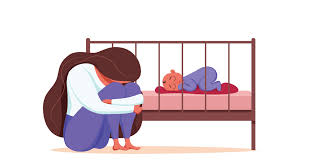“Nobody told me I could feel that way.”
I remember reading a new mother’s story and feeling gutted by those words.
No one sets out to hate a baby they’ve dreamt about having all their life. If your pregnancy was relatively uneventful, the chances are that you’re looking forward to kissing, holding, and loving your cuddly baby when he/she arrives. Nothing prepares anyone for the sudden switch from excitement to debilitating anxiety around motherhood. And expectedly, no one tells you it could happen. No one wants to jinx this huge expectation for you. This is the story of mothers who are going through or have survived post-partum depression.

Post-partum depression (now called peri-partum depression, recognizing that many cases actually begin during pregnancy), is a depressive mental illness occurring during pregnancy or after childbirth. Factors such as stressful or unwanted pregnancy, financial difficulties, personal or family history of depression, personal or family history of bipolar disorder, alcoholism, and lack of emotional support can predispose some women to experiencing this kind of depression. The sudden drop in pregnancy hormones after delivery may also contribute to peripartum depression.
No doubt, having a baby comes with enormous life changes and some level of initial anxiety is expected. Symptoms such as mood swings, crying spells, low energy, and difficulty with sleeping constitute the usual “baby blues” and can begin within the first two to three days after delivery, but generally subside within 2 weeks. However, when a new mum notices more severe symptoms for longer, such as not feeling connected to the baby, feeling hopeless, worthless, or guilty, having trouble focusing or making decisions, overeating or eating too little, having thoughts of hurting herself or her baby, all lasting for months, then she is probably experiencing peri-partum depression and should see a physician promptly.
“I am a horrible person. I don’t deserve to be a mother.”
Depression in general has a loud, prodding and accusing voice, and if you keep listening to it without getting help, it is empowered to either you drown in shame and guilt or drive you to take hurtful actions against yourself, or in this case, your baby.
Many mothers feel too embarrassed to talk about it, just hoping to struggle through their symptoms alone but peripartum depression isn’t a weakness to be ashamed of. Sometimes, it’s just a complication of giving birth and thankfully, treatment is available, and recovery is possible. Recognize that it’s a medical condition like any other and just like you would complain to a doctor about signs of an infection, your first big win is to speak with a psychiatrist about your symptoms.
The treatment modalities for peripartum depression includes Talk therapy with a psychotherapist, prescribed medications by a psychiatrist and in extreme cases, electroconvulsive therapy. In most cases, the first two treatment forms are adequate to reduce symptoms gradually till recovery is achieved. This may last as long as 12 months or more, but the measurable improvements that mothers experience are often encouraging enough to see the treatment process through.
If you’re a mum going through this, be determined to help the treatment process along by resting as much as you can, requesting and accepting help, spending time to do the things you love, and joining a support group in your area for learning, encouragement, and community. Also, try not to make any other big life changes such as moving houses, changing jobs etc. during this period to avoid loading up on stress.
